#donna allegra
Text
Donna Allegra - Stilled Life
Lesbianism
can be cured
and pickled
and forced into a jar
on the shelf
stuck way back in the dark
and carefully closed off
behind a closet door
and you don’t have to be reminded
of it ever again
until some dark night
when you’re groping
for just one sweet dream
to fill you up.
2 notes
·
View notes
Text

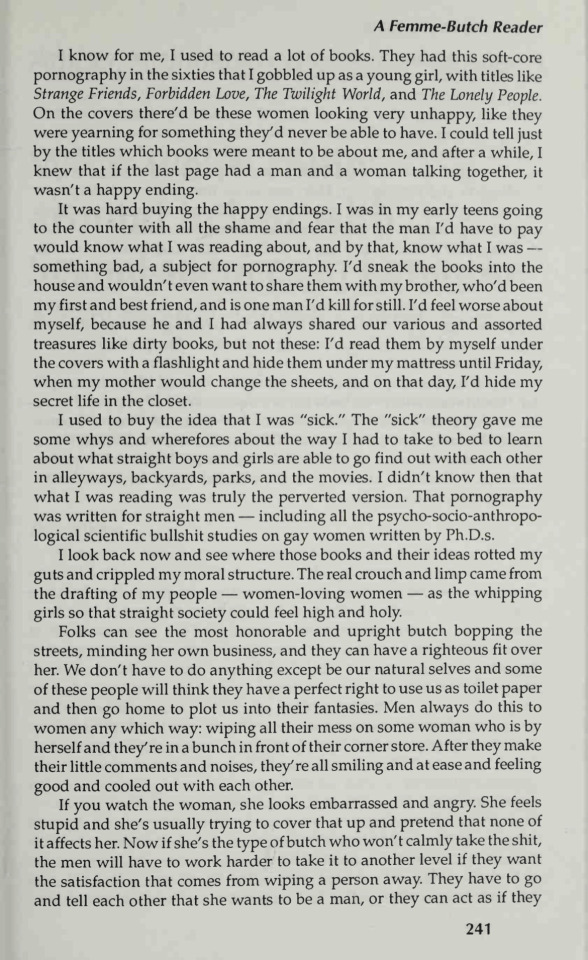
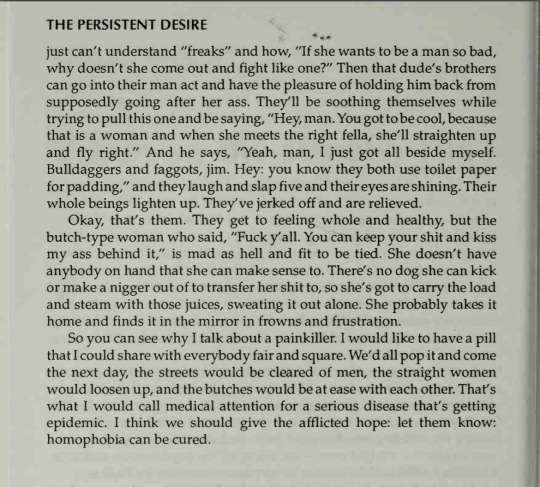
"Painkillers. I think I must have taken every pill short of the ones they use for birth control. I mean, like, I wouldn't know how to begin to get pregnant, but I could deal with modern technology coming up with a treatment to ease this one pain that won't let me rest in peace sometimes.
I may not be anybody's prize-winning puppy, but I'm all I've got and I like to take good care of the old girl. It took me a long time to understand the kid and get used to my evil ways, but I came around, I like being a butch. I like being with other butches with our nicknames and ball games- women with muscles and pretty faces. I don't believe in bisexuals and cannot for the life of me find a femme. I don't like men and I don't let them fuck me.
For me to live in this man's world, I need some kind of painkiller, something I can pull out at a moment's notice and put between me and the men on the street, because sometimes, I could really kill 'em. They're just the foulest beasts walking on two feet and they're always in packs, just like dogs. It wouldn't be so bad if the women that like them so much would keep them on leashes, curb them, and shoot the strays, but the dudes be all over the place pissing and dropping their turds every which way. And even faggots piss on trees.
So, like, between the men and the dogs, I need some way to keep the weight off my head. I live in New York City, and we dykes may be everywhere like the t-shirts and buttons say, but there aren't that many of us running around loose and free. And I get tired of watching my back and front, and having to look sideways because these men are so damn crazy.
It's not like there's a neighborhood or a space that's all our own where we could have gone to, hung out at, and worked through our growing pains as baby butches. I guess a lot of us learned our ways alone and in secret and we still come out with all the different styles of butches. I really dig on how I can always tell another butch, even if she's in straight drag.
I know for me, I used to read a lot of books. They had this soft-core pornography in the sixties that I gobbled up as a young girl, with titles like Strange Friends, Forbidden Love, The Twilight World, and The Lonely People. On the covers there'd be these women looking very unhappy, like they were yearning for something they'd never be able to have. I could tell just by the titles which books were meant to be about me, and after a while, I knew that if the last page had a man and a woman talking together, it wasn't a happy ending.
It was hard buying the happy endings. I was in my early teens going to the counter with all the shame and fear that the man I'd have to pay would know what I was reading about, and by that, know what it was- something bad, a subject for pornography. I'd sneak the books into the house and wouldn't even want to share them with my brother, who'd been my first and best friend, and is one man I'd kill for still. I'd feel worse about myself, because he and I had always shared our various and assorted treasures like dirty books, but not these: I'd read them by myself under the covers with a flashlight and hide them under my mattress until Friday, when my mother would change the sheets, and on that day, I'd hide my secret life in the closet.
I used to buy the idea that I was "sick." The "sick" theory gave me some whys and wherefores about the way I had to take to bed to learn about what straight boys and girls are able to go find out with each other in alleyways, backyard, parks, and the movies. I didn't know then that what I was reading was truly the perverted version. That pornography was written for straight men- including all the psycho-socio-anthropological scientific bullshit studies on gay women were written by Ph.D.s.
I look back now and see where those books and their ideas rotted my guts and crippled my moral structure. The real crouch and limp came from the drafting of my people - women-loving women- as the whipping girls so that straight society could feel high and holy.
Folks can see the most honorable and upright butch bopping the streets, minding her own business, and they can have a righteous fit over her. We don't have to do anything except be our natural selves and some of these people will think they have a perfect right to use us as toilet paper and then go home to plot us into their fantasies. Men always do this to women any which way: wiping all their mess on some woman who is by herself and they're in a bunch in front of their corner store. After they make their little comments and noises, they're all smiling and at ease and feeling good and cooled out with each other.
If you watch the woman, she looks embarrassed and angry. She feels stupid and she's usually trying to cover that up and pretend that none of it affects her. Now if she's the type of butch who won't calmly take the shit, the men will have to work harder to take it to another level if they want the satisfaction that comes from wiping a person away. They have to go and tell each other that she wants to be a man, or they can act as if they just can't understand "freaks" and how, "If she wants to be a man so bad, why doesn't she come out and fight like one?" Then that dude's brothers can go into their man act and have the pleasure of holding him back from suppposedly going after her ass. They'll be soothing themselves while trying to pull this one and be saying, "Hey, man. You got to be cool, because that is a woman and when she meets the right fella, she'll straighten up and fly right." And he says, "Yeah, man, I just got all beside myself. Bulldaggers and faggots, jim. Hey: you know they both use toilet paper for padding," and they laugh and slap five and their eyes are shining. Their whole beings lighten up. They've jerked off and are relieved.
Okay, that's them. They got to feeling whole and healthy, but the butch-type woman who said, "Fuck y'all. You can keep your shit and kiss my ass behind it," is mad as hell and fit to be tied. She doesn't have anybody on hand that she can make sense to. There's no dog she can kick or make a nigger out of to transfer her shit to, so she's got to carry the load and steam with those juices, sweating it out alone. She probably takes it home and finds it in the mirror in frowns and frustration.
So you can see why I talk about a painkiller. I would like to have a pill that I could share with everybody fair and square. We'd all pop it and come the next day, the streets would be cleared of men, the straight women would loosen up, and the butches would be at least with each other. That's what I would call medical attention for a serious disease that's getting epidemic. I think we should give the afflicted hope: let them know: homophobia can be cured."
"Butch on the Streets, 1981" by Donna Allegra, The Persistent Desire: A Butch/Femme Reader, edited by Joan Nestle (1992)
#the persistent desire#the persistent desire: a butch femme reader#Joan nestle#Donna Allegra#lesbian#lesbianism#lesbian history#butch#butch lesbian#femme#femme lesbian#butch history#butch lit#butchfemme#butchfemme history#lgbtq+#lesbian lit
8 notes
·
View notes
Text
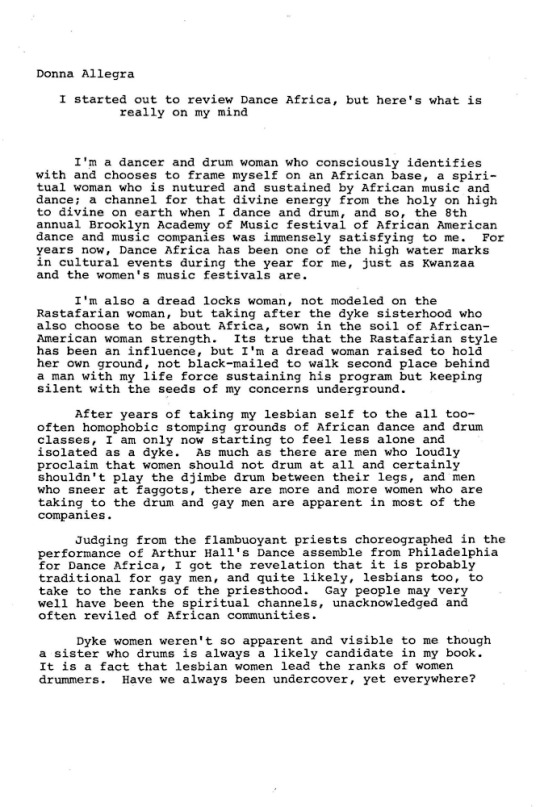
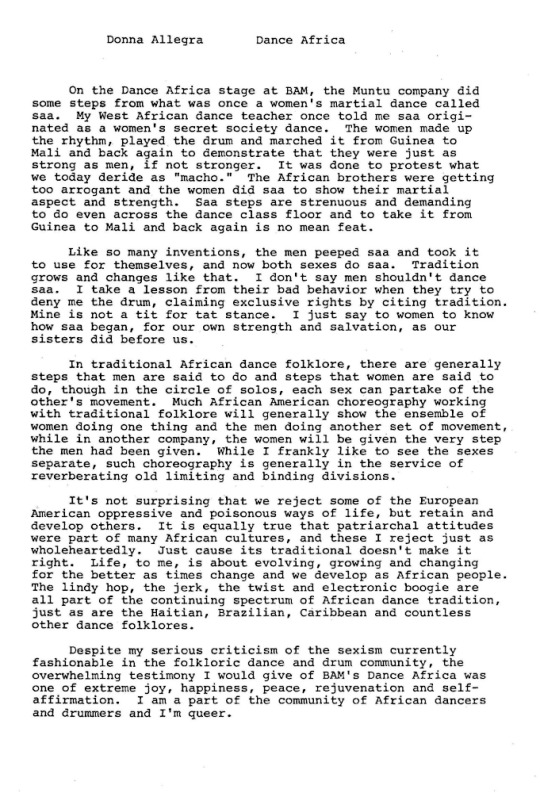
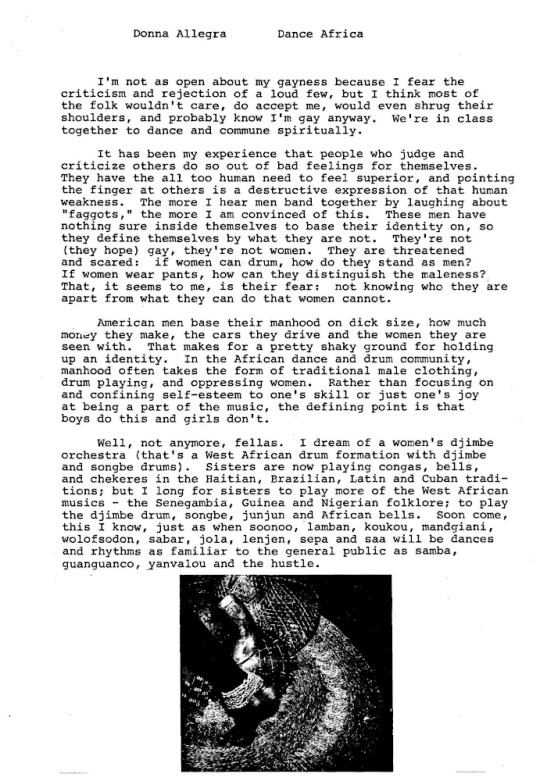
Donna Allegra, "Dance Africa" in the Fall 1985 issue of the Salsa Soul Gayzette
[Text under cut]
I started out to review Dance Africa, but here's what is really on my mind.
I'm a dancer and drum woman who consciously identifies with and chooses to frame myself on an African base, a spiritual woman who is nurtured and sustained by African music and dance; a channel for that divine energy from the holy on high to divine on earth when I dance and drum, and so, the 8th annual Brooklyn Academy of Music festival of African American dance and music companies was immensely satisfying to me. For years now, Dance Africa has been one of the high water marks in cultural events during the year for me, just as Kwanzaa and the women's music festivals are.
I'm also a dread locks woman, not modeled on the Rastafarian woman, but taking after the dyke sisterhood who also choose to be about Africa, sown in the soil of African- American woman strength. Its true that the Rastafarian style has been an influence, but I'm a dread woman raised to hold her own ground, not black-mailed to wälk second place behind a man with my life force sustaining his program but keeping silent with the seeds of my concerns underground.
After years of taking my lesbian self to the all too- often homophobic stomping grounds of African dance and drum classes, I am only now starting to feel less alone and isolated as a dyke. As much as there are men who loudly proclaim that women should not drum at all and certainly shouldn't play the djimbe drum between their legs, and men who sneer at faggots, there are more and more women who are taking to the drum and gay men are apparent in most of the companies.
Judging from the flambuoyant priests choreographed in the performance of Arthur Hall's Dance assemble from Philadelphia for Dance Africa, I got the revelation that it is probably traditional for gay men, and quite likely, lesbians too, to take to the ranks of the priesthood. Gay people may very well have been the spiritual channels, unacknowledged and often reviled of African communities.
Dyke women weren't so apparent and visible to me though a sister who drums is always a likely candidate in my book. It is a fact that lesbian women lead the ranks of women drummers. Have we always been undercover, yet everywhere?
On the Dance Africa stage at BAM, the Muntu company did some steps from what was once a women's martial dance called saa. My West African dance teacher once told me saa originated as a women's secret society dance. The women made up the rhythm, played the drum and marched it from Guinea to Mali and back again to demonstrate that they were just as strong as men, if not stronger. It was done to protest what we today deride as "macho." The African brothers were getting too arrogant and the women did saa to show their martial aspect and strength. Saa steps are strenuous and demanding to do even across the dance class floor and to take it from Guinea to Mali and back again is no mean feat.
Like so many inventions, the men peeped saa and took it to use for themselves, and now both sexes do saa. Tradition grows and changes like that. I don't say men shouldn't dance saa. I take a lesson from their bad behavior when they try to deny me the drum, claiming exclusive rights by citing tradition Mine is not a tit for tat stance. I just say to women to know how saa began, for our own strength and salvation, as our sisters did before us.
In traditional African dance folklore, there are generally steps that men are said to do and steps that women are said to do, though in the circle of solos, each sex can partake of the other's movement. Much African American choreography working with traditional folklore will generally show the ensemble of women doing one thing and the men doing another set of movement while in another company, the women will be given the very step the men had been given. While I frankly like to see the sexes separate, such choreography is generally in the service of reverberating old limiting and binding divisions.
It's not surprising that we reject some of the European American oppressive and poisonous ways of life, but retain and develop others. It is equally true that patriarchal attitudes were part of many African cultures, and these I reject just as wholeheartedly. Just cause its traditional doesn't make it right. Life, to me, is about evolving, growing and changing for the better as times change and we develop as African people The lindy hop, the jerk, the twist and electronic boogie are all part of the continuing spectrum of African dance tradition, just as are the Haitian, Brazilian, Caribbean and countless other dance folklores.
Despite my serious criticism of the sexism currently fashionable in the folkloric dance and drum community, the overwhelming testimony I would give of BAM's Dance Africa was one of extreme joy, happiness, peace, rejuvenation and self- affirmation. I am a part of the community of African dancers and drummers and I'm queer.
I'm not as open about my gayness because I fear the criticism and rejection of a loud few, but I think most of the folk wouldn't care, do accept me, would even shrug their shoulders, and probably know I'm gay anyway. We're in class together to dance and commune spiritually.
It has been my experience that people who judge and criticize others do so out of bad feelings for themselves. They have the all too human need to feel superior, and pointing the finger at others is a destructive expression of that human weakness. The more I hear men band together by laughing about "faggots," the more I am convinced of this. These men have nothing sure inside themselves to base their identity on, so they define themselves by what they are not. They're not (they hope) gay, they're not women. They are threatened and scared: if women can drum, how do they stand as men? If women wear pants, how can they distinguish the maleness? That, it seems to me, is their fear: not knowing who they are apart from what they can do that women cannot.
American men base their manhood on dick size, how much money they make, the cars they drive and the women they are seen with. That makes for a pretty shaky ground for holding up an identity. In the African dance and drum community, manhood often takes the form of traditional male clothing, drum playing, and oppressing women. Rather than focusing on and confining self-esteem to one's skill or just one's joy at being a part of the music, the defining point is that boys do this and girls don't.
Well, not anymore, fellas. I dream of a women's djimbe orchestra (that's a West African drum formation with djimbe and songbe drums). Sisters are now playing congas, bells, and chekeres in the Haitian, Brazilian, Latin and Cuban traditions; but I long for sisters to play more of the West African musics - the Senegambia, Guinea and Nigerian folklore; to play the djimbe drum, songbe, junjun and African bells. Soon come, this I know, just as when soonoo, lamban, koukou, mandgiani, wolofsodon, sabar, jola, lenjen, sepa and saa will be dances and rhythms as familiar to the general public as samba, guanguanco, yanvalou and the hustle.
3 notes
·
View notes
Text




Donna in "Isaac's Wedding" for anon
58 notes
·
View notes
Text
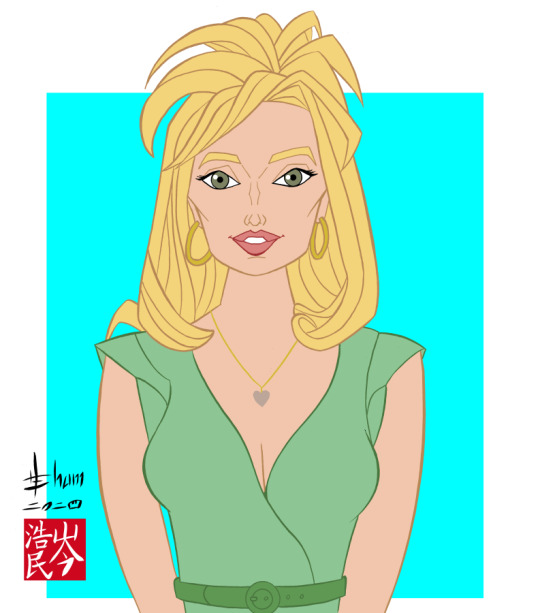
Here’s a drawing I did of Allegra Edwards as Donna on Ghosts. It would be nice if Pete visits her again in the future. I know it is too big a get, but I would like to see Kate McKinnon as Patience the Puritan next season.
18 notes
·
View notes
Text

US Vogue July 1966
Donna Allegra Caracciolo di Castagneto, in a marvelous side-closing coat by FedericoForquet, smooth wool printed in warm blocks of pink, orange, scarlet, black. Worn with Nucci of Rome earrings. Kislav gloves.
Donna Allegra Caracciolo di Castagneto, dans un merveilleux manteau à fermeture latérale par FedericoForquet, laine lisse imprimée en blocs chauds de rose, orange, écarlate, noir. Porté avec des boucles d'oreilles Nucci of Rome. Gants Kislav.
Photo Irving Penn
vogue archive
#us vogue#july 1966#fashion 60s#fall#automne#1966#federico forquet#nucci of rome#kislav#donna allegra caracciolo di castagneto#irving penn
26 notes
·
View notes
Text
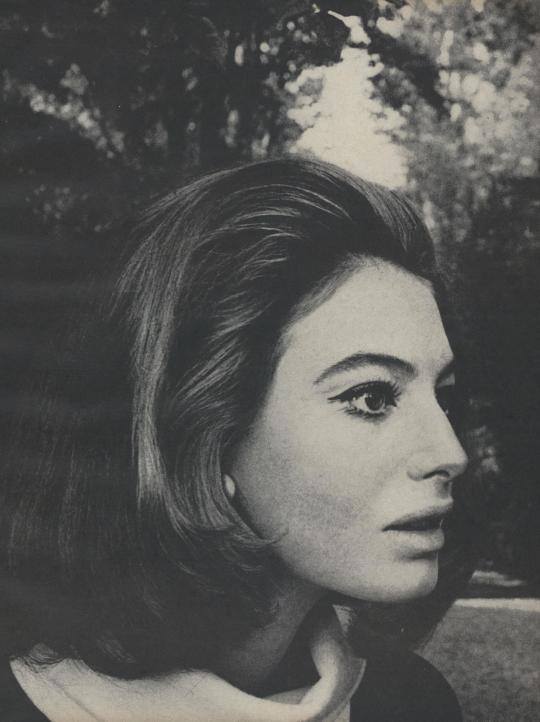

Donna Allegra Caracciolo di Castagneto (IT, 1945)
Le Magnifiche Caracciolo
Ugo Mulas for US Vogue 1966. Models Violante Visconti di Modrone, Donna Allegra Caracciolo di Castagneto
Donna Allegra by Henry Clarke Vogue Photos 1965
In 2004, Allegra Agnelli received an honorary degree in Veterinary Medicine University of Turin due to her persistent commitment to animals. In the same year, the then President of the Republic, Carlo Azeglio Ciampi, presented her with the Gold Medal of Merit of Public Health. - Always Ciampi, a year later, awarded her the 2005 Peace Prize.
profile and 2nd photo source:
#Donna Allegra Caracciolo di Castagneto#Italy#nobility#women#activism#animals#model#Ugo Mulas#portrait#fashion
11 notes
·
View notes
Photo

Sam: A Novel
By Allegra Goodman
Design by Donna Cheng.
Photograph by Mariam Sitchinava.
0 notes
Text

Se vuoi innamorarti di me
dimmi "ti amo" quando lo senti e non solo per dovere, non mentirmi mai, neanche per amore. Le mie paure zittiscile con un bacio. Non lasciarmi sola nelle decisioni importanti, ma insieme scegliamo.
Se vuoi innamorarti di me
dammi motivi per restare, sono stanca di scappare, sii la mia strada per tornare a casa e quando mi abbraccerai non dirmi "sei la donna della mia vita", ma vedi in me la vita e la vita da passare insieme.
Se vuoi innamorarti di me
Non darmi prove d'amore ma prova ogni giorno ad inventare l'amore con me e se sarò triste non pormi domande, ma rendimi allegra con le tue certezze.
Se vuoi innamorarti di me
toglimi la corazza che ho addosso, vestimi di luce per brillarti accanto e di notte fa' che allungando la mano trovi sempre la tua ad attender la mia.
Se vuoi innamorarti di me
105 notes
·
View notes
Text
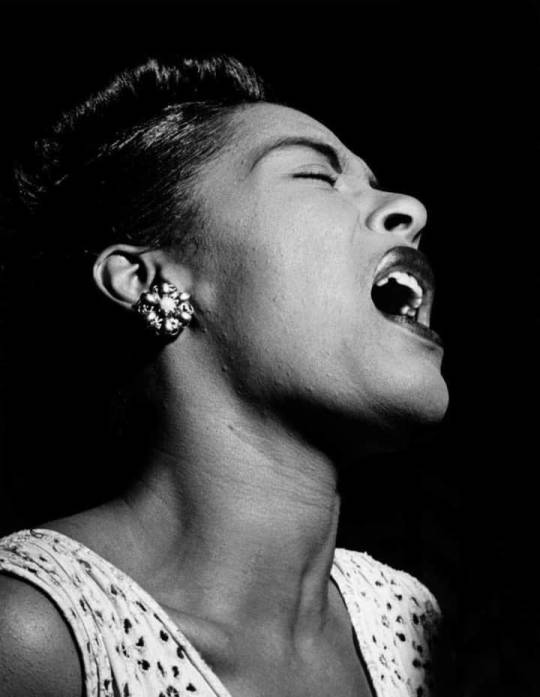
Billie Holiday
Filadelfia, 7 aprile 1915 – New York, 17 luglio 1959
[ Nella vita, per prima cosa devi avere da mangiare e un po' d'amore.]
Mi hanno detto che nessuno canta la parola "fame" e la parola "amore" come le canto io. Forse è perché so cosa han voluto dire queste parole per me, e quanto mi sono costate . Forse è perché son così orgogliosa da volere per forza ricordare Baltimora e Welfare Island, l'istituto cattolico e il tribunale di Jefferson Market, lo sceriffo davanti al ritrovo nostro di Harem, e le città sulla costa da un oceano all'altro dove ho preso le mie batoste e le mie fregature, Filadelfia e Alderson, San Francisco e Hollywood; ricordare metro per metro ogni dannato pezzo di tutto questo. Tutte le Cadillac e i visoni di questo mondo, e io ne ho avuti un bel po', non possono ripagarmi e nemmeno farmi dimenticare. Tutto quel che ho imparato in tutti questi posti da tutta questa gente si può riassumere in quelle due parole: nella vita, per prima cosa devi avere da mangiare e un po' d'amore.
ph Herman Leonard: Billie Holiday, NYC, New York, 1949
La storia di Billie Holiday è roba da racconti di Charles Dickens. Una infanzia disgraziata e di stenti con la madre che si arrabatta a far di tutto, pure la puttana per mangiare. Un quarantenne che la violenta a undici anni. Una zia sadica e fuori di testa di cui è vittima. Il misero collegio dove passa gli anni dell'adolescenza. Pochi motivi per essere allegra. Le cose cambiano, apparentemente in meglio, quando la sua meravigliosa voce diventa nota, prima nei piccoli ambienti jazz poi sempre a più persone. Nasce così Lady Day. Nasce così Lady sings the blues. Ma la fama non lenisce ciò che è stato, e allora per resistere e campare ci vogliono droghe e alcool e amori tutti sbagliati. Lei ne e' consapevole, ma, dice: "Sono stufa di passare le notti sola con i miei cani in albergo, dopo un concerto". O peggio "risvegliarmi ogni mattina accanto a un uomo diverso". Quando il 17 luglio 1949 si spegne ha solo 44 anni. Dirà Miles Davis: "Era una donna molto dolce, molto calda; sembrava un'indiana con la pelle vellutata, marrone chiaro. Era una donna splendida prima che l'alcool e la droga la distruggessero. Ogni volta che mi capitava di incontrarla le chiedevo di cantare "I Loves you, Porgy", perché ogni volta che lei cantava "non lasciare che mi tocchi con le sue mani calde" potevi praticamente sentire quello che sentiva lei. Il modo in cui la cantava era magnifico e triste. Tutti quanti amavano Billie".
Ma tutti quanti l'hanno sempre lasciata sola.
21 notes
·
View notes
Text
Il discorso integrale di Gino Cecchettin al termine dei funerali della figlia Giulia, 22enne uccisa dall'ex fidanzato.
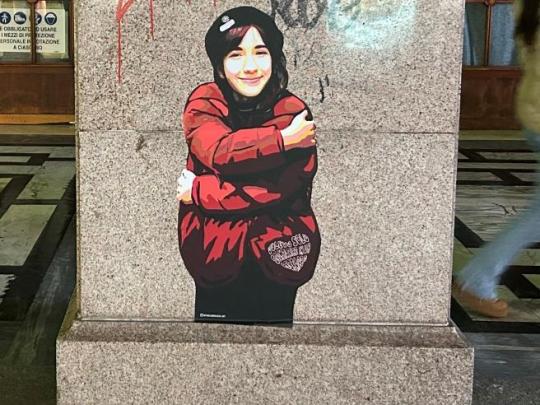
«Carissimi tutti, abbiamo vissuto un tempo di profonda angoscia: ci ha travolto una tempesta terribile e anche adesso questa pioggia di dolore sembra non finire mai. Ci siamo bagnati, infreddoliti, ma ringrazio le tante persone che si sono strette attorno a noi per portarci il calore del loro abbraccio. Mi scuso per l'impossibilità di dare riscontro personalmente, ma ancora grazie per il vostro sostegno di cui avevamo bisogno in queste settimane terribili. La mia riconoscenza giunga anche a tutte le forze dell’ordine, al vescovo e ai monaci che ci ospitano, al presidente della Regione Zaia e al ministro Nordio e alle istituzioni che congiuntamente hanno aiutato la mia famiglia.
Mia figlia Giulia, era proprio come l’avete conosciuta, una giovane donna straordinaria. Allegra, vivace, mai sazia di imparare. Ha abbracciato la responsabilità della gestione familiare dopo la prematura perdita della sua amata mamma. Oltre alla laurea che si è meritata e che ci sarà consegnata tra pochi giorni, Giulia si è guadagnata ad honorem anche il titolo di mamma. Nonostante la sua giovane età era già diventata una combattente,
un’oplita, come gli antichi soldati greci, tenace nei momenti di difficoltà:
il suo spirito indomito ci ha ispirato tutti. Il femminicidio è spesso il risultato di una cultura che svaluta la vita delle donne, vittime proprio di coloro avrebbero dovuto amarle e invece sono state vessate, costrette a lunghi periodi di abusi fino a perdere completamente la loro libertà
prima di perdere anche la vita. Come può accadere tutto questo? Come è potuto accadere a Giulia? Ci sono tante responsabilità, ma quella educativa ci coinvolge tutti: famiglie, scuola, società civile, mondo dell’informazione
Mi rivolgo per primo agli uomini, perché noi per primi dovremmo dimostrare di essere agenti di cambiamento contro la violenza di genere. Parliamo agli altri maschi che conosciamo, sfidando la cultura che tende a minimizzare la violenza da parte di uomini apparentemente normali.
Dovremmo essere attivamente coinvolti, sfidando la diffusione di responsabilità, ascoltando le donne e non girando la testa di fronte ai segnali di violenza anche i più lievi. La nostra azione personale è cruciale per rompere il ciclo e creare una cultura di responsabilità e supporto.
A chi è genitore come me, parlo con il cuore: insegniamo ai nostri figli il valore del sacrificio e dell’impegno e aiutiamoli anche ad accettare le sconfitte. Creiamo nelle nostre famiglie quel clima che favorisce un dialogo sereno perché diventi possibile educare i nostri figli al rispetto della sacralità di ogni persona, ad una sessualità libera da ogni possesso
e all’amore vero che cerca solo il bene dell’altro. Viviamo in un'epoca in cui la tecnologia ci connette in modi straordinari, ma spesso, purtroppo, ci isola e ci priva del contatto umano reale.
È essenziale che i giovani imparino a comunicare autenticamente,
a guardare negli occhi degli altri, ad aprirsi all'esperienza di chi è più anziano di loro. La mancanza di connessione umana autentica può portare a incomprensioni e a decisioni tragiche. Abbiamo bisogno di ritrovare la capacità di ascoltare e di essere ascoltati, di comunicare realmente con empatia e rispetto.
La scuola ha un ruolo fondamentale nella formazione dei nostri figli.
Dobbiamo investire in programmi educativi che insegnino il rispetto reciproco, l'importanza delle relazioni sane e la capacità di gestire i conflitti in modo costruttivo per imparare ad affrontare le difficoltà senza ricorrere alla violenza. La prevenzione della violenza inizia nelle famiglie,
ma continua nelle aule scolastiche, e dobbiamo assicurarci che le scuole siano luoghi sicuri e inclusivi per tutti.
Anche i media giocano un ruolo cruciale da svolgere in modo responsabile. La diffusione di notizie distorte e sensazionalistiche non solo alimenta un’atmosfera morbosa, dando spazio a sciacalli e complottisti, ma può anche contribuire a perpetuare comportamenti violenti. Chiamarsi fuori, cercare giustificazioni, difendere il patriarcato quando qualcuno ha la forza e la disperazione per chiamarlo col suo nome, trasformare le vittime in bersagli solo perché dicono qualcosa con cui magari non siamo d’accordo, non aiuta ad abbattere le barriere. Perché da questo tipo di violenza che è solo apparentemente personale e insensata si esce soltanto sentendoci tutti coinvolti. Anche quando sarebbe facile sentirsi assolti.
Alle istituzioni politiche chiedo di mettere da parte le differenze ideologiche per affrontare unitariamente il flagello della violenza di genere. Abbiamo bisogno di leggi e programmi educativi mirati a prevenire la violenza, a proteggere le vittime e a garantire che i colpevoli siano chiamati a rispondere delle loro azioni. Le forze dell’ordine devono essere dotate delle risorse necessarie per combattere attivamente questa piaga e degli strumenti per riconoscere il pericolo. Ma in questo momento di dolore e tristezza, dobbiamo trovare la forza di reagire, di trasformare questa tragedia in una spinta per il cambiamento. La vita di Giulia, la mia Giulia, ci è stata sottratta in modo crudele, ma la sua morte, può anzi deve essere il punto di svolta per porre fine alla terribile piaga della violenza sulle donne. Grazie a tutti per essere qui oggi: che la memoria di Giulia ci ispiri a lavorare insieme
per creare un mondo in cui nessuno debba mai temere per la propria vita.
Vi voglio leggere una poesia di Gibran che credo possa dare una reale rappresentazione di come bisognerebbe imparare a vivere.
«Il vero amore non è ne fisico ne romantico.
Il vero amore è l'accettazione di tutto ciò che è,
è stato, sarà e non sarà.
Le persone più felici non sono necessariamente
coloro che hanno il meglio di tutto,
ma coloro che traggono il meglio da ciò che hanno.
La vita non è una questione di come sopravvivere alla tempesta,
ma di come danzare nella pioggia…»
Cara Giulia, è giunto il momento di lasciarti andare. Salutaci la mamma. Ti penso abbracciata a lei e ho la speranza che, strette insieme, il vostro amore sia così forte da aiutare Elena, Davide e anche me non solo a sopravvivere a questa tempesta di dolore che ci ha travolto, ma anche ad imparare a danzare sotto la pioggia. Sì, noi tre che siamo rimasti vi promettiamo che, un po’ alla volta, impareremo a muovere passi di danza sotto questa pioggia.
Cara Giulia, grazie, per questi 22 anni che abbiamo vissuto insieme e per l’immensa tenerezza che ci hai donato. Anch’io ti amo tanto e anche Elena e Davide ti adorano. Io non so pregare, ma so sperare: ecco voglio sperare insieme a te e alla mamma, voglio sperare insieme a Elena e Davide e voglio sperare insieme a tutti voi qui presenti: voglio sperare che tutta questa pioggia di dolore fecondi il terreno delle nostre vite e voglio sperare che un giorno possa germogliare. E voglio sperare che produca il suo frutto d’amore, di perdono e di pace.
Addio Giulia, amore mio.
43 notes
·
View notes
Text
Love is in the air for Ghosts.
After a failed attempt at romance with car ghost Jessica and an ill-fated long-distance crush on Lenape spirit Shiki, Sas will get another chance at love in Season 4, it was revealed during the show’s San Diego Comic-Con panel last weekend.
Not much is currently known about Sas’ love interest, except that “we have a crazy way for Sas to meet someone this season,” co-showrunner Joe Port teased at the event. (Could it be courtesy of Pete’s power? Port did tell TVLine that the troop leader will be bringing one of his new ghost pals back to the mansion.)
The new paramour’s introduction couldn’t come at a better time, because “I just think Sasappis is really excited to fall in love,” his portrayer, Román Zaragoza, tells TVLine’s Keisha Hatchett in the above video. “I think he’s got the taste of it. I think he wants to just dive more into what that could be for him. And I think he’s got a lot of support from all the other ghosts about how to handle situations now. So it’s cool to see that vulnerable side of him.”
And Sas isn’t the only one whose heart may be opening up to new people. Now that his pal Pete can travel beyond the premises of Woodstone, he’ll be taking advantage of that ability to venture outside the B&B and interact with other ghosts.
“I hope, in this coming season, he’s going to get to continue to explore either relationships that he’s already started” — like with Allegra Edwards’ Donna? — “or new relationships,” says Richie Moriarty, who plays Pete. “It’s exciting because, like, a whole new world truly has opened up to Pete. So he’s going to be meeting a ton of different ghosts this season, and I’m very excited to play all that.”
One spirit that Pete won’t have to travel far to encounter is Patience (played by Mary Holland), the Puritan ghost who dragged Isaac into the dirt. And if you think that was scary, just wait until you learn what she can do with her special ability.
“We get to learn what Patience’s ghost power is, and the power is intense,” Moriarty teases. “I think it throws everyone in the house off. So we all are a bit standoffish with Patience at first. We’re all a little bit terrified.”
Elsewhere in the interview, Zaragoza and Moriarty preview the fallout from the Season 3 finale cliffhanger, and talk about Sas and Jay’s unique friendship.
Ghosts Season 4 premieres Thursday, Oct. 17 at 8:30/7:30c on CBS.
youtube
8 notes
·
View notes
Text
Spiaggia di Scauri, agosto 2022, lei si chiama Teresa ha poco meno di 30 anni, due figli adolescenti e in braccio una bimba nera di circa 18 mesi, si chiama Sonia. Mi guardo attorno e cerco sua madre. Ma donne africane nemmeno l'ombra. Teresa avrà forse un compagno africano, con cui ha avuto la bimba, penso, ma non è possibile perché Sonia sarebbe stata mulatta e non nero ebano. La bimba ha treccine annodate da mani di donna africana. Gioca e scherza sulla spiaggia con Teresa e i suoi figli. Teresa prepara l'asciugamani per avvolgerla subito dopo il bagnetto, le toglie il costumino bagnato, le mette il pannolino, le da la pappa e poi l'addormenta all'ombra, nel passeggino. Sono curiosa di sapere qual é il legame tra la bimba ebano e Teresa con la sua famiglia. E così mi avvicino ed ammirando Sonia, che dorme appaciata e serena, cerco di sapere.
"la madre è una giovane donna del Senegal che lavora sulle spiagge, vende abiti, fa treccine, e Sonia andava in giro con lei sotto al sole tutto il giorno." dice Teresa "così pian piano la tenevamo noi, un giorno, poi due, poi tre. Prima per qualche ora, poi la bimba era contenta e così la madre me l'ha affidata." Teresa e la sua famiglia fa vacanza a Scauri e tiene con sé la bimba, lasciando sua madre serena nel suo lavoro stancante e Sonia fa la bimba, con i tempi... suoi tempi. Gioca amata da Teresa e dai suoi figli. Tutta la spiaggia collabora e lei è allegra e sorridente passa di braccia in braccia, come ad una festa tutta per lei. La sera Teresa la riporta alla madre. Sonia piange, il più delle volte, perché vorrebbe restare con Teresa.
"ma lei è la madre" dice Teresa "é giusto che stia con lei la sera, a lavoro finito"
Una storia di solidarietà, una cura al contrario non un immigrata che cresce i figli della signora bianca al mare, ma una famiglia napoletana che gratuitamente cresce una bambina figlia di immigrati.
Questa storia é un esempio di amore senza confini e senza pregiudizi.

Carola Flauto
7 notes
·
View notes
Text
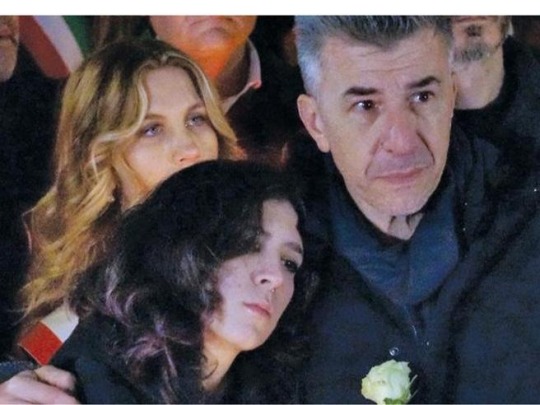
Risuonano forti le parole lette in chiesa durante l’ultimo saluto a Giulia dal suo papà, Gino Cecchettin.
“Mia figlia Giulia, era proprio come l’avete conosciuta, una giovane donna straordinaria.
Allegra, vivace, mai sazia di imparare.
Ha abbracciato la responsabilità della gestione familiare dopo la prematura perdita della sua amata mamma. Oltre alla laurea che si è meritata e che ci sarà consegnata tra pochi giorni, Giulia si è guadagnata ad honorem anche il titolo di mamma. Nonostante la sua giovane età era già diventata una combattente, un’oplita, come gli antichi soldati greci, tenace nei momenti di difficoltà: il suo spirito indomito ci ha ispirato tutti.
Il femminicidio è spesso il risultato di una cultura che svaluta la vita delle donne, vittime proprio di coloro avrebbero dovuto amarle e invece sono state vessate, costrette a lunghi periodi di abusi fino a perdere completamente la loro libertà prima di perdere anche la vita.
Come può accadere tutto questo?
Come è potuto accadere a Giulia?
Ci sono tante responsabilità, ma quella educativa ci coinvolge tutti: famiglie, scuola, società civile, mondo dell’informazione
Mi rivolgo per primo agli uomini, perché noi per primi dovremmo dimostrare di essere agenti di cambiamento contro la violenza di genere.
Parliamo agli altri maschi che conosciamo, sfidando la cultura che tende a minimizzare la violenza da parte di uomini apparentemente normali.
Dovremmo essere attivamente coinvolti, sfidando la diffusione di responsabilità, ascoltando le donne, e non girando la testa di fronte ai segnali di violenza anche i più lievi. La nostra azione personale è cruciale per rompere il ciclo e creare una cultura di responsabilità e supporto.
A chi è genitore come me, parlo con il cuore: insegniamo ai nostri figli il valore del sacrificio e dell’impegno e aiutiamoli anche ad accettare le sconfitte. Creiamo nelle nostre famiglie quel clima che favorisce un dialogo sereno perché diventi possibile educare i nostri figli al rispetto della sacralità di ogni persona, ad una sessualità libera da ogni possessoe all’amore vero che cerca solo il bene dell’altro. Viviamo in un'epoca in cui la tecnologia ci connette in modi straordinari, ma spesso, purtroppo, ci isola e ci priva del contatto umano reale.
È essenziale che i giovani imparino a comunicare autenticamente, a guardare negli occhi degli altri, ad aprirsi all'esperienza di chi è più anziano di loro.
La mancanza di connessione umana autentica può portare a incomprensioni e a decisioni tragiche. Abbiamo bisogno di ritrovare la capacità di ascoltare e di essere ascoltati, di comunicare realmente con empatia e rispetto.
La scuola ha un ruolo fondamentale nella formazione dei nostri figli.
Dobbiamo investire in programmi educativi che insegnino il rispetto reciproco, l'importanza delle relazioni sane e la capacità di gestire i conflitti in modo costruttivo per imparare ad affrontare le difficoltà senza ricorrere alla violenza.
La prevenzione della violenza di gene e inizia nelle famiglie, ma continua nelle aule scolastiche, e dobbiamo assicurarci che le scuole siano luoghi sicuri e inclusivi per tutti.
Anche i media giocano un ruolo cruciale da svolgere in modo responsabile. La diffusione di notizie distorte e sensazionalistiche non solo alimenta un’atmosfera morbosa, dando spazio a sciacalli e complottisti, ma può anche contribuire a perpetuare comportamenti violenti.
Chiamarsi fuori, cercare giustificazioni, difendere il patriarcato quando qualcuno ha la forza e la disperazione per chiamarlo col suo nome, trasformare le vittime in bersagli solo perché dicono qualcosa con cui magari non siamo d’accordo, non aiuta ad abbattere le barriere.
Perché da questo tipo di violenza che è solo apparentemente personale e insensata si esce soltanto sentendoci tutti coinvolti. Anche quando sarebbe facile sentirsi assolti.
Alle istituzioni politiche chiedo di mettere da parte le differenze ideologiche per affrontare unitariamente il flagello della violenza di genere. Abbiamo bisogno di leggi e programmi educativi mirati a prevenire la violenza, a proteggere le vittime e a garantire che i colpevoli siano chiamati a rispondere delle loro azioni. Le forze dell’ordine devono essere dotate delle risorse necessarie per combattere attivamente questa piaga e degli strumenti per riconoscere il pericolo. Ma in questo momento di dolore e tristezza, dobbiamo trovare la forza di reagire, di trasformare questa tragedia in una spinta per il cambiamento.
La vita di Giulia, la mia Giulia, ci è stata sottratta in modo crudele, ma la sua morte, può anzi deve essere il punto di svolta per porre fine alla terribile piaga della violenza sulle donne.
Grazie a tutti per essere qui oggi: che la memoria di Giulia ci ispiri a lavorare insieme per creare un mondo in cui nessuno debba mai temere per la propria vita.
Vi voglio leggere una poesia di Gibran che credo possa dare una reale rappresentazione di come bisognerebbe imparare a vivere.
«Il vero amore non è ne fisico ne romantico.
Il vero amore è l'accettazione di tutto ciò che è,
è stato, sarà e non sarà.
Le persone più felici non sono necessariamente coloro che hanno il meglio di tutto, ma coloro che traggono il meglio da ciò che hanno.
La vita non è una questione di come sopravvivere alla tempesta, ma di come danzare nella pioggia…»
Cara Giulia, è giunto il momento di lasciarti andare. Salutaci la mamma.
Ti penso abbracciata a lei e ho la speranza che, strette insieme, il vostro amore sia così forte da aiutare Elena, Davide e anche me non solo a sopravvivere a questa tempesta di dolore che ci ha travolto, ma anche ad imparare a danzare sotto la pioggia.
Sì, noi tre che siamo rimasti vi promettiamo che, un po’ alla volta, impareremo a muovere passi di danza sotta questa pioggia.
Cara Giulia, grazie, per questi 22 anni che abbiamo vissuto insieme e per l’immensa tenerezza che ci hai donato. Anch’io ti amo tanto e anche Elena e Davide ti adorano.
Io non so pregare, ma so sperare: ecco voglio sperare insieme a te e alla mamma, voglio sperare insieme a Elena e Davide e voglio sperare insieme a tutti voi qui presenti: voglio sperare che tutta questa pioggia di dolore fecondi il terreno delle nostre vite e voglio sperare che un giorno possa germogliare.
E voglio sperare che produca il suo frutto d’amore, di perdono e di pace.
Addio Giulia, amore mio”.
#tumblr#frasi forza#coraggio#amarsi#resilienza#frasi tumblr#nonunadimeno#donna#donne#violenza#giulia#giulia cecchettin#basta#respect#papà#famiglia#amore tumblr#dolore#senza parole#parole#femminicidio#amore mio#amore eterno#amore puro#inseparabili#sofferenza#silenzio#ai giovani#ragazzi#khalil gibran
26 notes
·
View notes
Text

In una lettera datata 27 luglio 1949, il grande Italo Calvino, legato a Cesare Pavese da un rapporto di profonda stima reciproca, chiamato dal più maturo scrittore a scrivergli le proprie impressioni su Tra donne sole, non lesinava critiche: "Tra donne sole è un romanzo che ho subito deciso che non mi sarebbe piaciuto. Sono ancora di tale opinione, sebbene l’abbia letto con grande interesse e divertimento... è un certo modo di vedere le donne, e di trarne vendetta allegra o triste. E la cosa che scombussola di più è quella donna-cavallo pelosa, con la voce cavernosa e l’alito che sa di pipa e fin dal principio si capisce che sei tu con la parrucca e con i seni finti…"
"Tu sei solo, e lo sai. Tu sei nato per vivere sotto le ali di un altro, sorretto e giustificato da un altro, che sia però tanto gentile da lasciarti fare il matto e illudere di bastare da solo a rifare il mondo. Non trovi mai nessuno che duri tanto; di qui, il tuo soffrire i distacchi – non per tenerezza. Di qui, il tuo rancore per chi se n’è andato; di qui la tua facilità a trovarti un nuovo patrono – non per cordialità. Sei una donna, e come donna sei caparbio. Ma non basti da solo, e lo sai." (Da Il mestiere di vivere)
9 notes
·
View notes
Text

"Ma quelli che vogliono la donna seria, ma porca a letto. Che non rompa le palle, ma sia precisa. Che sia allegra, ma non esaurita. Che sia libera, ma con moderazione, la vogliono anche che cammini sulle acque? Chiedo.”
(web)
36 notes
·
View notes